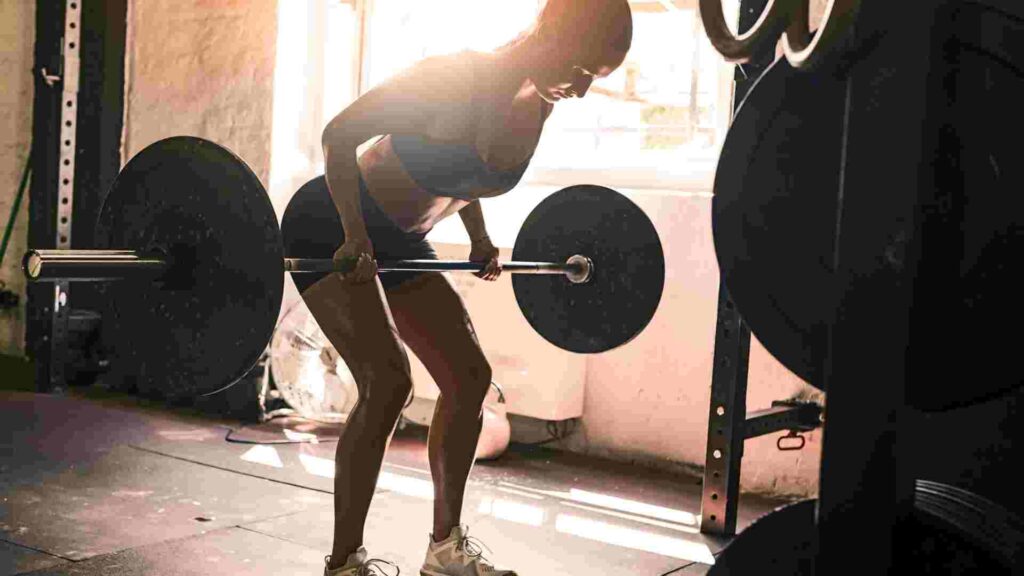Beginner Guide to Lifting Weights Safely: Lifting weights is a fantastic way to improve your fitness, build muscle, and boost overall health. However, if you’re a beginner, it’s crucial to start correctly to avoid injuries and maximize results. This guide will walk you through everything you need to know to lift weights safely and effectively.
Table of Contents
1. Benefits of Weightlifting
Weightlifting offers numerous advantages:
- Increases strength: Helps you perform daily activities more efficiently.
- Boosts metabolism: Builds muscle, which burns more calories even at rest.
- Improves bone health: Enhances bone density, reducing the risk of osteoporosis.
- Enhances mental health: Releases endorphins, reducing stress and anxiety.
- Improves posture and balance: Strengthens core and stabilizer muscles.
- Supports longevity: Promotes healthy aging by maintaining muscle mass and functionality.
2. Setting Up for Success
Consult a Doctor
If you have any pre-existing conditions, consult your doctor before starting.
Get the Right Gear
- Comfortable workout clothes
- Weightlifting shoes with proper grip
- Optional: Weightlifting gloves to protect your hands
Learn Proper Technique
Consider working with a certified trainer or watching credible online tutorials. Remember, proper form is more important than the amount of weight you lift.
Set Realistic Goals
- Start with achievable milestones, like lifting a specific weight or mastering a particular exercise.
- Track your progress to stay motivated.
3. Basic Weightlifting Guidelines
Start with Light Weights
Begin with weights that allow you to complete 12-15 reps with proper form.
Warm Up
Spend 5-10 minutes warming up with dynamic stretches or light cardio. This prepares your muscles and joints for the workout.
Focus on Form
Prioritize correct posture and controlled movements over heavy weights. Bad form can lead to injuries.
Gradually Increase Intensity
Once you’re comfortable, progressively add weight or reps to challenge your muscles.
Rest Between Sets
Take 30-90 seconds between sets to recover. Adjust rest periods based on the intensity of your workout.
Maintain Consistency
Stick to a regular schedule, and aim to train each muscle group at least once a week.
4. Common Weightlifting Mistakes to Avoid
- Skipping warm-ups
- Using excessive weight
- Holding your breath (practice controlled breathing)
- Neglecting other muscle groups (workout should be balanced)
- Rushing through exercises without proper control
- Ignoring rest days, which are essential for muscle recovery
5. Sample Beginner Workout Plan
Day 1: Full-Body Workout
- Squats: 3 sets of 12 reps
- Push-Ups: 3 sets of 10 reps (modify if needed)
- Dumbbell Rows: 3 sets of 12 reps per arm
- Plank: 3 rounds of 20 seconds
Day 2: Rest or Light Cardio
Day 3: Upper Body
- Dumbbell Bench Press: 3 sets of 12 reps
- Bicep Curls: 3 sets of 15 reps
- Shoulder Press: 3 sets of 12 reps
- Tricep Dips: 3 sets of 10 reps
Day 4: Rest or Stretching
Day 5: Lower Body
- Deadlifts: 3 sets of 12 reps
- Lunges: 3 sets of 10 reps per leg
- Calf Raises: 3 sets of 15 reps
- Glute Bridges: 3 sets of 12 reps
Days 6 & 7: Rest or Active Recovery
6. Nutrition Tips for Weightlifting Beginners
- Eat Enough Protein: Aim for 1.2-2.0 grams of protein per kilogram of body weight daily.
- Stay Hydrated: Drink plenty of water throughout the day.
- Consume Balanced Meals: Include carbohydrates for energy and healthy fats for recovery.
- Snack Wisely: Opt for pre- and post-workout snacks like bananas, protein shakes, or nuts.
7. Safety Tips
- Use a Spotter: Especially for heavy lifts like bench presses.
- Stay Hydrated: Drink water before, during, and after your workout.
- Listen to Your Body: Stop immediately if you feel pain or discomfort.
- Cool Down: Stretch after each session to improve flexibility and reduce soreness.
- Maintain a Neutral Spine: Keep your back straight during lifts to avoid strain.
FAQs: Beginner Guide to Lifting Weights Safely
Q1: How many days a week should I lift weights as a beginner?
Aim for 2-3 days a week to allow your muscles to recover.
Q2: Can I lose weight by lifting weights?
Yes! Weightlifting builds muscle, which boosts metabolism and aids in fat loss.
Q3: How long should my weightlifting sessions be?
Start with 30-45 minutes per session, including warm-ups and cool-downs.
Q4: Should I do cardio before or after lifting weights?
If your goal is strength, lift weights first; if endurance, prioritize cardio.
Q5: What if I don’t have access to a gym?
You can use resistance bands, bodyweight exercises, or household items like water bottles for weightlifting.
Q6: How do I know when to increase the weight?
If you can perform all your reps with ease and maintain proper form, it’s time to increase the weight.
Q7: Is soreness normal after lifting weights?
Yes, especially as a beginner. This is called Delayed Onset Muscle Soreness (DOMS) and indicates your muscles are adapting to the workout.
Starting your weightlifting journey can be intimidating, but with the right approach, you’ll see progress while staying safe. Remember, consistency and patience are key. Happy lifting!

